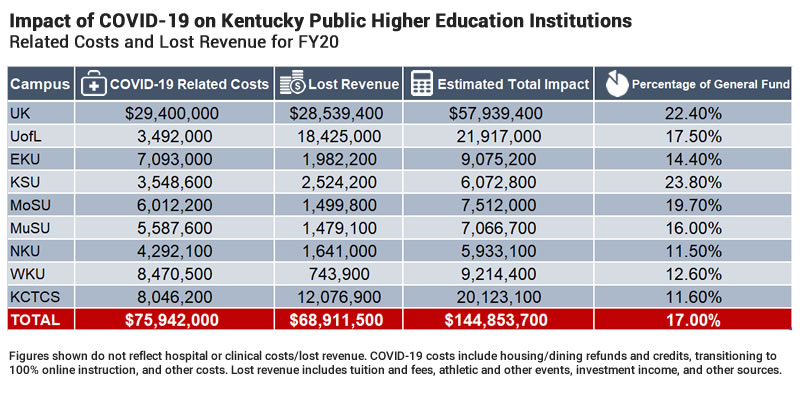CPE projects $144M impact on campuses so far from COVID-19
July 29, 2020

New estimates from the Kentucky Council on Postsecondary Education (CPE) show that COVID-19 has inflicted a staggering financial toll on public colleges and universities, driving unexpected costs and lost revenue at a time when campuses are striving to keep tuition low.
CPE President Aaron Thompson provided the numbers to state lawmakers this month in a report to the Interim Budget Review Subcommittee on Education.
While the estimates remain fluid, they reveal that campuses suffered a $144.8 million financial blow in fiscal year 2020 due to the outbreak. That's equal to 17% of the state general fund dollars allocated to public colleges and universities for the year.

Thompson warned that the numbers provide only an indication of the coming financial challenges for higher education. However, he said campuses have so far performed above and beyond their funding levels.
"We are using this opportunity to advance strategic innovation, and not just wring our hands," Thompson said. "You are going to see new approaches to academics and student support, and a focus on boosting long-term employment and economic sustainability. Higher education will be the key to getting our economy back on track."
The budget strains included $75.9 million in pandemic-related costs, such as refunds and credits on housing and dining, technology expenses related to online instruction and the expense of sanitizing facilities.
Campuses also faced $68.9 million in lost revenue due to impacts on tuition, decreased parking revenue, investment losses, and the cancellation of sporting events, summer programs and other activities.
The totals did not include costs or lost revenue from hospital operations at the University of Kentucky or the University of Louisville, which would have increased the numbers significantly.
Even with the lack of resources and funding, our campuses have shown an unwavering commitment to college affordability and the welfare of students. - CPE President Aaron Thompson
Meanwhile, state colleges and universities have kept tuition increases at a minimum this year or avoided them altogether. The average increase for fall 2020 is expected to total 0.7%, the smallest increase in decades.
"Even with the lack of resources and funding, our campuses have shown an unwavering commitment to college affordability and the welfare of students," Thompson said. "They have also done a tremendous job protecting the health and safety of students and employees while maintaining academic progress in unprecedented times."
CPE provided guidance to campuses in May, emphasizing the need to follow state and federal health protocols. The Council also recommended flexibility in coursework with a combination of in-person, online and hybrid approaches to instruction when students return in the fall. Campuses are developing detailed restart plans that cover a range of contingencies.
Funds from the federal CARES Act have also helped shore up campus resources. The legislation provided $54.5 million for student grants and the same amount for institutions within the state system to help cover COVID-19-related costs.
Thompson said campuses are using the money for housing, dining and parking refunds, technology needs, training for online instruction, personal protective gear, cleaning, virus testing and monitoring.
The CARES Act also provided $44 million to Kentucky in the Governor's Emergency Education Relief Fund, and Gov. Andy Beshear allocated $13.8 million of that amount to higher education under the administration of CPE.
Thompson said $8.8 million was distributed to public universities, $2.5 million to the Kentucky Community and Technical College System and $1 million to Kentucky's non-profit, private colleges and universities. CPE set aside another $1.5 million in an emergency reserve fund.
While the federal dollars have helped stave off an even worse financial outcome, they have still fallen short of covering the pandemic's impact so far, he said.
Last Updated: 7/23/2021
